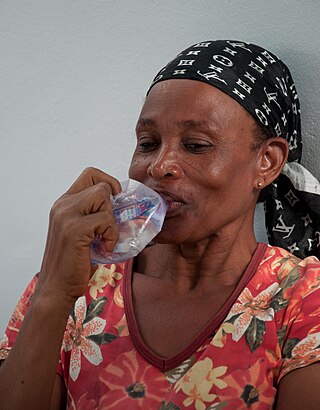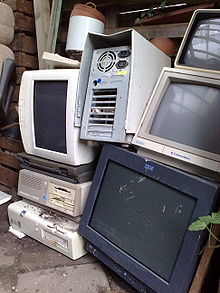
Environmental racism, ecological racism or ecological apartheid is a form of institutional racism leading to landfills, incinerators, and hazardous waste disposal being disproportionately placed in communities of color. Internationally, it is also associated with extractivism, which places the environmental burdens of mining, oil extraction, and industrial agriculture upon indigenous peoples and poorer nations largely inhabited by people of color.

Illegal dumping, also called fly dumping or fly tipping (UK), is the dumping of waste illegally instead of using an authorized method such as curbside collection or using an authorized rubbish dump. It is the illegal deposit of any waste onto land, including waste dumped or tipped on a site with no license to accept waste. The United States Environmental Protection Agency developed a “profile” of the typical illegal dumper. Characteristics of offenders include local residents, construction and landscaping contractors, waste removers, scrap yard operators, and automobile and tire repair shops.
Environmental justice or eco-justice, is a social movement to address environmental injustice, which occurs when poor or marginalized communities are harmed by hazardous waste, resource extraction, and other land uses from which they do not benefit. The movement has generated hundreds of studies showing that exposure to environmental harm is inequitably distributed.

Electronic waste describes discarded electrical or electronic devices. It is also commonly known as waste electrical and electronic equipment (WEEE) or end-of-life (EOL) electronics. Used electronics which are destined for refurbishment, reuse, resale, salvage recycling through material recovery, or disposal are also considered e-waste. Informal processing of e-waste in developing countries can lead to adverse human health effects and environmental pollution. The growing consumption of electronic goods due to the Digital Revolution and innovations in science and technology, such as bitcoin, has led to a global e-waste problem and hazard. The rapid exponential increase of e-waste is due to frequent new model releases and unnecessary purchases of electrical and electronic equipment (EEE), short innovation cycles and low recycling rates, and a drop in the average life span of computers.

Environmental harmful product dumping is the practice of transfrontier shipment of waste from one country to another. The goal is to take the waste to a country that has less strict environmental laws, or environmental laws that are not strictly enforced. The economic benefit of this practice is cheap disposal or recycling of waste without the economic regulations of the original country.

A waste picker is a person who salvages reusable or recyclable materials thrown away by others to sell or for personal consumption. There are millions of waste pickers worldwide, predominantly in developing countries, but increasingly in post-industrial countries as well.
Guiyu is a town created from an agglomerate of four adjoined villages totalling 150,000 people in the Chaoyang district of Guangdong province in China. Situated on the South China Sea coast, Guiyu is perhaps best known in the global environmentalist community for its reception of e-waste. In fact, the town also holds the record for being the largest e-waste site of the world, as of 2013.

Waste are unwanted or unusable materials. Waste is any substance discarded after primary use, or is worthless, defective and of no use. A by-product, by contrast is a joint product of relatively minor economic value. A waste product may become a by-product, joint product or resource through an invention that raises a waste product's value above zero.

Healthcare in Ghana is mostly provided by the national government, and less than 5% of GDP is spent on healthcare. The healthcare system still has challenges with access, especially in rural areas not near hospitals.

The World Reuse, Repair and Recycling Association (WR3A) is a business consortium dedicated to the reform of the trade of e-waste. The WR3A is inspired by fair trade organizations.
Guiyu, in Guangdong Province, China, is widely perceived as the largest electronic waste (e-waste) site in the world. In 2005, there were 60,000 e-waste workers in Guiyu who processed the more than 100 truckloads that were transported to the 52-square-kilometre area every day. The constant movement into and processing of e-wastes in the area leading to the harmful and toxic environment and living conditions, coupled with inadequate facilities, have led to the Guiyu town being nicknamed the "electronic graveyard of the world".

Electronic waste or e-waste in the United States refers to electronic products that have reached the end of their operable lives, and the United States is beginning to address its waste problems with regulations at a state and federal level. Used electronics are the quickest-growing source of waste and can have serious health impacts. The United States is the world leader in producing the most e-waste, followed closely by China; both countries domestically recycle and export e-waste. Only recently has the United States begun to make an effort to start regulating where e-waste goes and how it is disposed of. There is also an economic factor that has an effect on where and how e-waste is disposed of. Electronics are the primary users of precious and special metals, retrieving those metals from electronics can be viewed as important as raw metals may become more scarce
Electronic waste or e-waste in China refers to electronic products that are no longer usable and are therefore dumped or recycled. China is the world's largest importer and producer of electronic waste with over 70% of all global e-waste ending up in the world's largest dumpsites. An estimated 60–80% of this e-waste is handled through illegal informal recycling processes, without the necessary safety precautions legally required by Chinese government regulations. Processing e-waste in this way directly causes serious environmental damage and permanent health risks in areas surrounding the disposal sites. While the Chinese government and the international community have taken action to regulate e-waste management, ineffective enforcement, legislative loopholes, and the pervasiveness of informal recycling have been obstacles to mitigating the consequences of e-waste.

Agbogbloshie is a nickname of a commercial district on the Korle Lagoon of the Odaw River, near the center of Accra, Ghana's capital city in the Greater Accra region. Near the slum called "Old Fadama", the Agbogbloshie site became known as a destination for externally generated automobile and electronic scrap collected from mostly the western world. It was a center of a legal and illegal exportation network for the environmental dumping of electronic waste (e-waste) from industrialized nations. The Basel Action Network, a small NGO based in Seattle, has referred to Agbogbloshie as a "digital dumping ground", where they allege millions of tons of e-waste are processed each year.

Electronic waste is emerging as a serious public health and environmental issue in India. India is the "Third largest electronic waste producer in the world"; approximately 2 million tons of e-waste are generated annually and an undisclosed amount of e-waste is imported from other countries around the world.

Joseph Nana Kwame Awuah-Darko, also known as Okuntakinte, is a Ghanaian social entrepreneur, artist, and philanthropist. He started his music career professionally in late 2015 when he was signed with Meister Music Management which also manages artists like Mr. Eazi. He released his major hit Melanin Girls in January 2016, which was received with controversy as much as with appreciation.
China's waste import ban, instated at the end of 2017, prevented foreign inflows of waste products. Starting in early 2018, the government of China, under Operation National Sword, banned the import of several types of waste, including plastics. The ban has greatly affected recycling industries worldwide, as China had been the world's largest importer of waste plastics and processed hard-to-recycle plastics for other countries, especially in the West.
Ghana has one of the highest rates of cybercrime in the world, ranking 7th in a 2008 Internet Crime Survey. The most popular form of cybercrime in Ghana is cyberfraud and is typically achieved via credit card fraud. However, recent decreases in universal credit card usage has seen the expansion of other cybercrimes such as blackmail and hacking. This growth in crime has warranted a government response, with policies specifically addressing the cyberspace being developed. This has necessitated various studies including a cyber security maturity study which was inaugurated by the Ministry of Communications and conducted by the Global Cyber Security Capacity Center (GCSCC) of the University of Oxford in collaboration with the World Bank.

Squatting in Ghana is the occupation of unused land or derelict buildings without the permission of the owner. Informal settlements are found in cities such as Kumasi and the capital Accra. Ashaiman, now a town of 100,000 people, was swelled by squatters. In central Accra, next to Agbogbloshie, the Old Fadama settlement houses an estimated 80,000 people and is subject to a controversial discussion about eviction. The residents have been supported by Amnesty International, the Centre on Housing Rights and Evictions and Shack Dwellers International.

Water sachets or sachet water is a common form of selling pre-filtered or sanitized water in plastic, heat sealed bags in parts of the global south, and are especially popular in Africa. Water sachets are cheaper to produce than plastic bottles, and easier to transport. In some countries, water vendors refer to sachet water as "pure water".
















